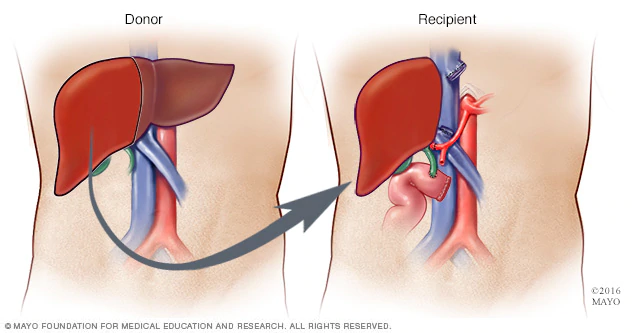Liver Transplant (Living Related Donor) in Izmir
Find the best clinics for Liver Transplant (Living Related Donor) in Izmir
With Medijump you can browse 1 facilities offering Liver Transplant (Living Related Donor) procedures in Izmir. The cheapest price available is $40,000 in Izmir
Liver Transplant (Living Related Donor) in Turkey
Price: $ 40,000
Liver Transplant (Living Related Donor) in Izmir
Price: $ 40,000
Liver Transplant (Living Related Donor) in Istanbul
Price: $ 60,000
India offers the best prices Worldwide
Price: $ 35,013
Izmir Medicalpoint Hospital, located in Karsiyaka, Izmir, Turkey offers patients Liver Transplant (Living Related Donor) procedures among its total of 4 available procedures, across 4 different specialties. The cost of a Liver Transplant (Living Related Donor) procedure ranges from $54,102 to $60,865, whilst the national average price is approximately $67,628. All procedures and treatments are undertaken by just a small team of specialists, with 2 in total at the Hospital, and they have multiple recognized accreditations, including: JCI AccreditedISO Certification - International Organization for StandardizationEFQM - European Foundation for Quality Management
WHY US?
At Medijump, we're making medical easy. You can search, compare, discuss, and book your medical all in one place. We open the door to the best medical providers worldwide, saving you time and energy along the way, and it's all for FREE, no hidden fees, and no price markups guaranteed. So what are you waiting for?

Free

Best Price

Widest Selection

Risk-Free
What you need to know about Liver Transplant (Living Related Donor) in Izmir

A liver transplant is a surgical procedure that replaces a liver that is diseased or no longer functions properly with a liver from a deceased donor or a portion of a healthy liver from a living donor. The living donor can be:
-
Someone who is emotionally related to the recipient such as a good friend, a significant other, or a spouse.
-
A family member of the recipient, such as a parent, adult child, brother, or sister.
-
Other biologically related relatives, such as an aunt, uncle, or cousin.
-
A person who has heard about the transplant candidate’s need.
-
Altruistic donation or non-directed living-donor. This means that the donor does not know or name the recipient of the donated liver. The match is based on blood type compatibility and medical need. The donor may choose not to know the recipient or may meet if both agree.
When the living donor is a family member, it is called a living related donor liver transplant.
Living related donor liver transplant is usually used as an alternative to waiting for a deceased donor liver or an altruistic donation to become available. A liver transplant from a living donor is possible because the human liver can regenerate and return to its normal size, capacity, and volume within a couple of months after surgical removal of part of the organ. The transplanted liver portion in the recipient will grow and restore normal liver function as well.
Not everyone can be a living related donor. The donor has to be healthy and able to safely undergo major surgery. In addition, the donor’s blood type, age, and organ size are critical considerations in determining whether the recipient and the donor are a match. Extensive health and psychological evaluation are required to make sure that the donor and the recipient are a match, as well as to assess the donor’s mental and physical health.
What does a Liver Transplant (Living Related Donor) Procedure Involve?
A liver transplant surgery from a living donor is usually scheduled in advance.
The surgeons will first operate on the donor. The surgery is done under general anesthesia, a portion of the donor's liver is removed through an incision in the abdomen. Both the left and right lobe of the liver can be used for donation. The specific part of the liver donated depends on the donor liver’s size and the recipient’s needs. Around 40% to 70% of the donor’s liver is removed for transplantation.
Once the donor's liver is ready, the surgeons will perform the liver transplant on you (the recipient). During this surgery, an anesthesiologist will give you a general anesthetic. After you are anesthetized, the surgeons will create an incision under the ribs on both sides of your belly and separate the diseased liver from the nearby organs and structures to carefully remove it. Then, the donated liver portion will be placed in your body by connecting the bile ducts and blood vessels to the new liver. The final step is closing the incision with stitches or surgical staples.
How Long Should I Stay in Izmir for a Liver Transplant (Living Related Donor) Procedure?
After a living related donor liver transplant, you should expect to spend 5 to 10 days in the hospital. Expect to stay in Izmir for at least a month after you are discharged from the hospital as you need to attend follow-up checkups. Your liver transplant team will design a checkup schedule for you. Laboratory blood tests are typically obtained twice a week after transplantation and will be reduced gradually. You must attend all of the follow-up checkups and blood tests because your doctor needs to check your condition.
What's the Recovery Time for Liver Transplant (Living Related Donor) Procedures in Izmir?
The recovery period depends on the severity of your condition before your liver transplant surgery. In general, the full recovery time until you feel fully healed after your liver transplant surgery can take around six months or more. However, you should be able to return to some of your normal activities, including work (office job) within 2 to 4 months following your surgery. Simple activities of daily living may be resumed within a few weeks.
What sort of Aftercare is Required for Liver Transplant (Living Related Donor) Procedures in Izmir?
-
You will take medication for the rest of your life – the medications are called immunosuppressant (anti-rejection medicines), which works by keeping your immune system from attacking your new liver. They are used to help the transplanted liver survive in your body.
-
You will take other medications – you may need other types of medications to help reduce the risk of other complications.
-
Avoid crowds or anyone who has an infection – anti-rejection medicines affect your immune system, increasing your risk of infections. Therefore, you need to avoid contact with anyone who has an infection or crowds for the first few months.
-
Eat a well-balanced diet –to help you recover and keep your new liver healthy. A dietitian from your transplant team will discuss your nutrition and diet needs. In general, your diet should be low in fat, salt, cholesterol, and sugar. You also need to avoid alcohol.
-
Exercise regularly – walk as much as you can soon after your transplant. Then, start to incorporate more physical activity into your daily life. Make sure to check in with your transplant team before starting an exercise routine.
What's the Success Rate of Liver Transplant (Living Related Donor) Procedures in Izmir?
The success rate of the liver transplant depends on your specific situation. In general, around 75% of people who have a liver transplant live for at least five years. People who receive a liver from a living related donor usually have longer survival rates than those who receive a deceased donor liver. Also, people who have a living related donor liver transplant seem to experience fewer medical problems.
The risks and side effects associated with liver transplant include rejection of the donated liver, bleeding, bile duct complications, failure of donated liver, infection, mental confusion, seizures, and recurrence of liver disease in the transplanted liver.
Are there Alternatives to Liver Transplant (Living Related Donor) Procedures in Izmir?
There are currently no alternatives to a liver transplant. However, the alternative to living related donor liver transplant is to wait for a deceased donor liver or an altruistic donation to become available. Make sure to discuss with your doctor the best option for your case.
What Should You Expect Before and After the Procedure
Before a living related liver transplant, you may have acute or chronic liver failure, which may be caused by a variety of conditions, or you may have certain cancers that originate in the liver. After the procedure, these conditions may be cured. Your survival rates will be increased significantly after the procedure.
Whilst the information presented here has been accurately sourced and verified by a medical professional for its accuracy, it is still advised to consult with your doctor before pursuing a medical treatment at one of the listed medical providers
No Time?
Tell us what you're looking for and we'll reachout to the top clinics all at once
Enquire Now

Popular Procedures in Izmir
Prices Start From $50

Prices Start From $22,731

Prices Start From $39

Recommended Medical Centers in Izmir for Liver Transplant (Living Related Donor)

- Interpreter services
- Translation service
- Religious facilities
- Medical records transfer
- Medical travel insurance
- Health insurance coordination
- TV in the room
- Safe in the room
- Phone in the room
- Private rooms for patients available

- Interpreter services
- Translation service
- Religious facilities
- Medical records transfer
- Medical travel insurance
- Health insurance coordination
- TV in the room
- Safe in the room
- Phone in the room
- Private rooms for patients available

- Interpreter services
- Translation service
- Religious facilities
- Medical records transfer
- Medical travel insurance
- Health insurance coordination
- TV in the room
- Safe in the room
- Phone in the room
- Private rooms for patients available


